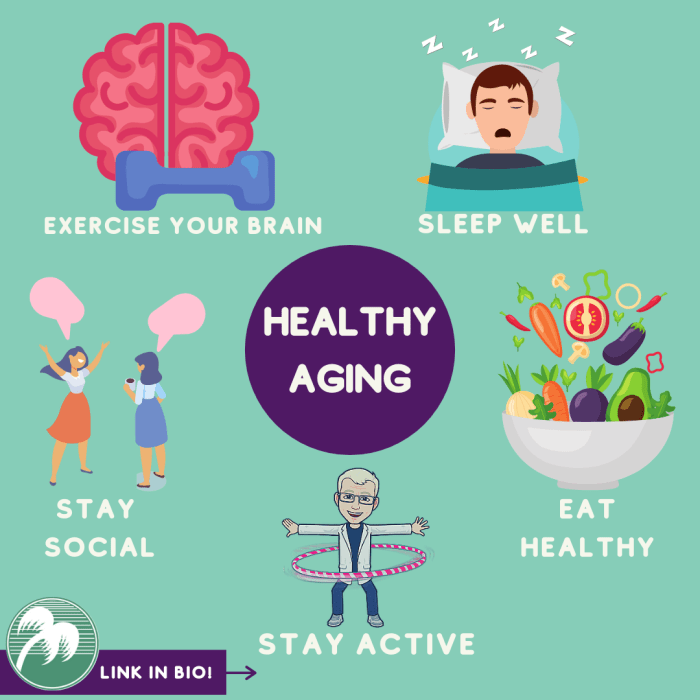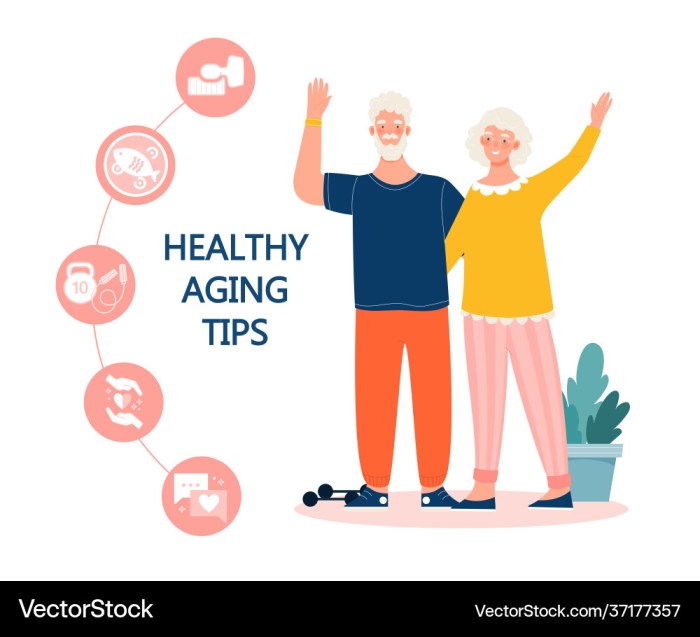Healthy aging is more than just growing old—it’s about living a vibrant and fulfilling life as you age gracefully. From nutrition to physical activity, cognitive health to chronic disease management, this guide covers all aspects of aging well.
Introduction to Healthy Aging
Healthy aging refers to the process of developing and maintaining the functional ability that enables well-being in older age. It involves making choices and taking actions to support physical, mental, and social well-being as people age. Embracing healthy aging is crucial for individuals to live a fulfilling and active life as they grow older.
Benefits of Healthy Aging
- Improved overall health and well-being
- Enhanced quality of life
- Increased longevity and independence
- Reduced risk of chronic diseases
- Enhanced cognitive function and mental health
Key Factors for Healthy Aging
- Regular physical activity
- Healthy diet and nutrition
- Adequate sleep and rest
- Mental stimulation and social engagement
- Avoiding harmful habits like smoking and excessive alcohol consumption
Nutrition for Healthy Aging

Proper nutrition plays a crucial role in promoting healthy aging by providing essential nutrients that support overall health and well-being. As we age, our bodies require specific nutrients to maintain optimal functioning and prevent age-related diseases.
Examples of Nutrient-Rich Foods
Eating a variety of nutrient-rich foods can help support healthy aging. Some examples include:
- Leafy green vegetables such as spinach, kale, and collard greens, which are rich in vitamins A, C, and K, as well as fiber.
- Fatty fish like salmon, mackerel, and sardines, which are high in omega-3 fatty acids that support brain health and reduce inflammation.
- Berries such as blueberries, strawberries, and raspberries, which are packed with antioxidants that help protect cells from damage.
- Nuts and seeds like almonds, walnuts, and chia seeds, which provide healthy fats, protein, and fiber.
- Whole grains such as quinoa, brown rice, and oats, which are good sources of fiber, vitamins, and minerals.
Importance of Hydration
Staying hydrated is essential for healthy aging as water plays a vital role in various bodily functions. Dehydration can lead to fatigue, confusion, and other health issues, especially in older adults. It is important to drink an adequate amount of water throughout the day and consume hydrating foods like fruits and vegetables to support overall health and well-being.
Physical Activity and Exercise
Regular physical activity plays a crucial role in healthy aging by improving overall health and well-being. It can help seniors maintain their independence, reduce the risk of chronic diseases, and enhance quality of life.
Types of Exercises for Seniors
- Aerobic Exercises: Activities like walking, swimming, or cycling can improve cardiovascular health and endurance.
- Flexibility Exercises: Stretching exercises can increase flexibility, reduce stiffness, and improve range of motion.
- Balance Exercises: Tai Chi or yoga can help prevent falls and improve stability.
Benefits of Strength Training for Older Adults
Strength training, also known as resistance training, is beneficial for seniors as it helps increase muscle mass, strength, and bone density. This type of exercise can also improve metabolism, balance, and overall functional ability in daily activities.
Cognitive Health and Mental Well-being

Maintaining cognitive health and mental well-being is crucial as we age. It involves implementing strategies to keep our minds sharp and promoting emotional wellness through social interactions.
Strategies for Maintaining Cognitive Health
- Engage in mentally stimulating activities such as puzzles, reading, or learning a new skill to exercise your brain.
- Stay physically active, as exercise has been shown to have positive effects on cognitive function.
- Eat a healthy diet rich in antioxidants and omega-3 fatty acids, which can benefit brain health.
- Get enough quality sleep to support memory consolidation and cognitive function.
Importance of Social Interaction for Mental Well-being, Healthy aging
Social interaction plays a vital role in maintaining mental well-being in older adults. It can help reduce feelings of isolation and loneliness, improve mood, and provide a sense of belonging and purpose.
Tips for Promoting Emotional Wellness
- Stay connected with friends and family members to build a support network and foster meaningful relationships.
- Practice mindfulness and relaxation techniques to reduce stress and promote emotional balance.
- Engage in activities that bring you joy and fulfillment, whether it’s hobbies, volunteering, or spending time in nature.
- Seek professional help or counseling if you’re struggling with emotional challenges, as it’s important to address mental health concerns proactively.
Chronic Disease Management
Chronic diseases are long-lasting conditions that often worsen over time and are commonly associated with aging. Managing these conditions is crucial for maintaining overall health and well-being in older adults.
Common Chronic Conditions Associated with Aging
- Heart disease
- Diabetes
- Hypertension (high blood pressure)
- Osteoarthritis
- Osteoporosis
Preventive Measures for Managing Chronic Diseases in Older Adults
- Adopting a healthy diet rich in fruits, vegetables, whole grains, and lean proteins.
- Engaging in regular physical activity to maintain a healthy weight and reduce the risk of chronic conditions.
- Managing stress through activities like yoga, meditation, or deep breathing exercises.
- Quitting smoking and limiting alcohol consumption to reduce the risk of heart disease and other chronic illnesses.
Role of Regular Health Screenings in Maintaining Healthy Aging
Regular health screenings play a crucial role in early detection and prevention of chronic diseases in older adults. These screenings can help identify risk factors and allow for timely intervention to manage conditions effectively. Common health screenings include blood pressure checks, cholesterol tests, blood sugar monitoring, and cancer screenings. By staying proactive and keeping up with regular screenings, older adults can better manage their health and reduce the impact of chronic diseases on their overall well-being.
Sleep and Stress Management: Healthy Aging
Quality sleep and effective stress management play crucial roles in promoting healthy aging. Adequate rest and stress reduction are essential for maintaining overall well-being and cognitive function as we age.
Importance of Quality Sleep for Healthy Aging
Quality sleep is vital for healthy aging as it allows the body to repair and regenerate cells, promote cognitive function, and maintain overall health. Older individuals often experience changes in their sleep patterns, such as difficulty falling asleep or staying asleep. Lack of quality sleep can lead to issues like memory problems, mood swings, and a weakened immune system.
- Establish a consistent sleep schedule by going to bed and waking up at the same time every day.
- Create a relaxing bedtime routine to signal to your body that it’s time to wind down.
- Avoid stimulants like caffeine and electronic devices before bedtime.
- Ensure your sleep environment is comfortable, quiet, and free of distractions.
Effective Stress Management Techniques for Healthy Aging
Chronic stress can have detrimental effects on both physical and mental health, especially as we age. Implementing effective stress management techniques can help reduce the impact of stress on the body and mind.
- Practice mindfulness and relaxation techniques, such as deep breathing exercises or meditation.
- Engage in regular physical activity to release endorphins and reduce stress levels.
- Maintain a strong social support network to share your feelings and experiences with others.
- Prioritize self-care activities that bring you joy and relaxation, such as hobbies or spending time in nature.
Skin Care and Aging
As we age, our skin undergoes various changes that can impact its appearance and health. It’s important to understand how aging affects the skin and what common skin concerns older adults may face.
Effects of Aging on the Skin
As we get older, our skin naturally loses collagen and elastin, leading to sagging and wrinkles. Additionally, the skin becomes thinner and drier, making it more prone to damage and irritation. Age spots, uneven skin tone, and reduced elasticity are also common issues that come with aging.
Skincare Routines and Products for Aging Skin
- Use a gentle cleanser to remove dirt and impurities without stripping the skin of its natural oils.
- Moisturize regularly to hydrate the skin and prevent dryness.
- Incorporate products with antioxidants like vitamin C to protect the skin from free radical damage.
- Consider using retinoids to promote collagen production and improve skin texture.
Tips for Healthy Skin as We Age
- Protect your skin from the sun by using sunscreen daily and wearing protective clothing.
- Stay hydrated by drinking plenty of water and eating water-rich foods like fruits and vegetables.
- Eat a balanced diet rich in vitamins and minerals to support overall skin health.
- Avoid smoking and limit alcohol consumption, as these habits can accelerate skin aging.
